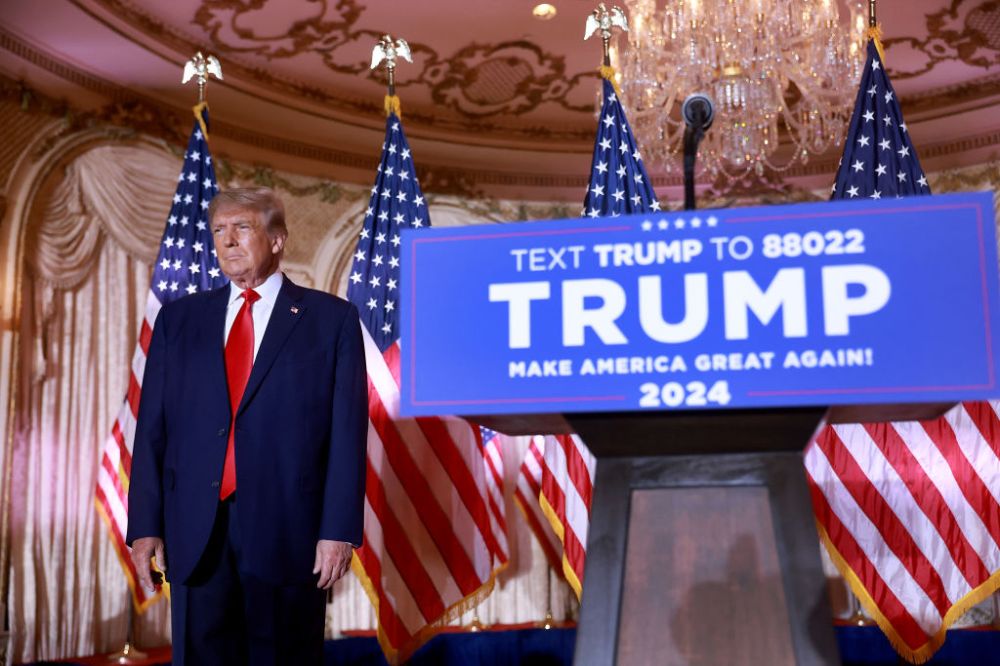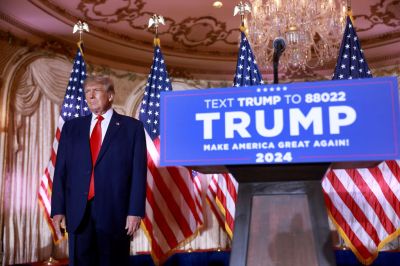Starter
The whispers in Washington are getting louder: Does the appointment of a special counsel to investigate whether any laws were broken after classified documents were found in President Joe Biden’s office, home, and garage change Biden’s decision to run for reelection? Should it?
Legally, I think it is highly unlikely that special counsel Rob Hur will recommend that Attorney General Merrick Garland pursue charges against President Biden. Of course, it's worth noting here that he also can’t pursue charges against a sitting president under current DOJ guidelines. But a prosecutor could recommend for charges to be brought when the president leaves office, for example, and that would almost be more damning. I think that scenario is unlikely based on what we know now, which has none of the elements that Jim Comey laid out as necessary when he declined to pursue charges against Hillary Clinton back in 2016: clearly intentional conduct, a vast number of documents, disloyalty to the United States, or obstruction.
That being said, I also think there is a lot we don’t know about what has happened to those documents for the last six years. And I’ll also note that I’ve worked closely with Rob Hur and he’s an experienced, highly competent federal prosecutor. And federal prosecutors are like hunting dogs. They don’t like to go running through the marsh without bringing something back in their mouth.
But all of that is beside the point of whether this changes the political calculation for Biden. After all, he ran on being different from Donald Trump. And so far, the really striking difference is that Biden’s unsecured classified documents were kept in a garage next to a Corvette and Trump’s were in a desk under a photo of Celine Dion. Democrats may be defending Biden publicly, but privately they are not amused at the position he’s put them in.
The problem for Democrats is that none of this fundamentally changes the underlying problem: They have no one else waiting in the wings. If Biden doesn’t run, the spotlight immediately turns to Vice President Kamala Harris. And to whether Biden will endorse Harris—who nobody thinks can win the general election. But if he doesn’t endorse Harris, it’s an insult to a key part of the Democratic base and makes the Democratic primary a free for all. There is no good scenario.
If Biden doesn’t run, Republicans suddenly are in the catbird seat if they can manage to nominate literally anyone except Donald Trump. Of course, that’s a big if. But all of that means that Biden will run if he can.
Main Course
Why is only one guy running for president right now?
Donald Trump announced he was running again for president on November 15, 2022. And here we are two months later, and it’s like it never happened. Trump hasn’t been barnstorming New Hampshire and Iowa, but also no other candidates have thrown their hats in the ring. Is that a sign of strength for Trump’s candidacy or weakness?
It would certainly be a show of force if we thought that no other GOP candidates were going to run. But we don’t think that at all. In fact, the question isn’t whether but how many. Larry Hogan, Chris Christie, Asa Hutchinson, Mike Pompeo, Ted Cruz, Tim Scott, Mike Pence, Glenn Youngkin … none of these guys’ plans changed because Trump entered the game.
So when do people announce for president? Why aren’t we hearing more?
I put together a quick timeline from the last few cycles so you could get a sense of how unusual it is to have one person’s announcement hang out there by itself for this long. Some things worth noticing: There’s always a pack of candidates who announce within weeks of each other. There’s no correlation between the eventual nominee and when a candidate announces in absolute terms or even in relation to the pack. And both sides’ packs have followed very different timelines even in the same cycle: i.e., the pack—either GOP or Dem—dictates announcement schedules more than anything about the campaign cycle.
2008
John Edwards: December 26, 2006
Chris Dodd: January 11
Hillary Clinton: January 20
Joe Biden: January 31
Barack Obama: February 10
Duncan Hunter: January 25
Mike Huckabee: January 27
Mitt Romney: February 13
Rudy Giuliani: February 15
John McCain: February 28
Fred Thompson: September 5
2012
Newt Gingrich: May 11, 2011
Ron Paul: May 13
Herman Cain: May 21
Tim Pawlenty: May 23
Mitt Romney: June 2
Rick Santorum: June 6
Jon Huntsman: June 21
Michelle Bachmann: June 27
Rick Perry: August 13
2016
Ted Cruz: March 23, 2015
Rand Paul: April 7
Marco Rubio: April 13
Ben Carson: May 4
Carly Fiorina: May 4
Mike Huckabee: May 5
Rick Santorum: May 27
George Pataki: May 28
Lindsey Graham: June 1
Rick Perry: June 4
Jeb Bush: June 15
Donald Trump: June 16
Bobby Jindal: June 24
Chris Christie: June 30
Scott Walker: July 13
John Kasich: July 21
Jim Gilmore: July 30
Hillary Clinton: April 15
Bernie Sanders: May 26
Martin O’Malley: May 30
2020
Tulsi Gabbard: January 11, 2019
Julian Castro: January 12
Kamala Harris: January 21
Cory Booker: February 1
Elizabeth Warren: February 9
Amy Klobuchar: February 10
Bernie Sanders: February 19
John Hickenlooper: March 4
Beto O’Rourke: March 14
Kirsten Gillibrand: March 17
Tim Ryan: April 4
Pete Buttigieg: April 14
Joe Biden: April 25
Bill De Blasio: May 16
Andrew Yang: November 6
Deval Patrick: November 14
Mike Bloomberg: November 24
It’s also important to note that these are the official public announcements so they don’t include things like exploratory committees or leadership PACs. Jeb Bush didn’t make his presidential announcement until June 15, but he announced his exploratory committee in December after the 2014 midterms.
Even taking all that into account, what starts to emerge on both sides is candidates’ racing against each other’s strengths. Look at how tightly packed the 2008 Democratic primary announcement calendar is. In less than six weeks, every major candidate had entered the game before Valentine’s Day. Why? Remember back in 2008, Hillary Clinton was considered the clear frontrunner. And she had no reason to be in a rush. High name ID, plenty of money, tons of infrastructure that could be turned on with a snap of her fingers. But Barack Obama didn’t have any of that. If he was going to pull this thing off, he needed a long runway. For starters, he was going to have to convince every single donor that he could get it done and that they should put their political capital on the line by bucking Clinton. Once the Clinton people knew that Obama was going to go early, they didn’t have a choice but to follow suit. She couldn’t give him any room to woo donors and party leaders unimpeded. And the other campaigns couldn’t let this become a two-person race. So within a few weeks, the whole pack was in.
Our timing around Carly was entirely based on when we thought we could get enough money in the door to ensure our first FEC report wasn’t a total embarrassment. FEC reports come out at the end of each quarter, so it’s a little like a game of hopscotch. You need to jump into the race in between reports but with enough time to bring in some real money. We needed time to introduce Carly to donors—months of flights, dinners, phone calls. If the peloton had all gotten into the race in January of that year, we would have been in a lot of trouble.
So what’s happening this time around? From what I understand, nobody is in any sort of rush, in part because of the shift away from large-dollar donors to small-dollar fundraising. Candidates don’t need to race around the country kissing a bunch of rings if they’ve got sophisticated data and digital plans to raise money online. Tim Pawlenty and Scott Walker ran out of money in their races—notorious cautionary tales about what it means when you’ve got too big a staff with too little coming in the door. But I don’t believe any of the heavyweights think they’ll have that problem this time around because of that limitless small-dollar pool.
It’s also clear a Ron DeSantis announcement will have more influence over the pack than Trump’s did. All of the other candidates’ raison d'etre is that they believe they are the best person to beat Trump in a head-to-head matchup—but DeSantis clearly stands in the way of that possibility. In that sense, DeSantis is more their opponent than Trump. Which sounds a lot like every GOP campaign in November of 2015, come to think of it. The only difference in 2015 is that there wasn’t an obvious second frontrunner like DeSantis. But see the Christie-Rubio debate smackdown.
I predict you’ll see some of the smaller teams jump in before spring. Hutchinson could get a nice attention bump by being the next guy in. But, of course, he’ll run into the same FEC report problem that we had. Ditto Larry Hogan. But I bet Pence and Youngkin hang back a while. And DeSantis? He’ll wait as long as he can.
Dessert
Always question the things that you are most sure about. Bet accordingly.







Please note that we at The Dispatch hold ourselves, our work, and our commenters to a higher standard than other places on the internet. We welcome comments that foster genuine debate or discussion—including comments critical of us or our work—but responses that include ad hominem attacks on fellow Dispatch members or are intended to stoke fear and anger may be moderated.
With your membership, you only have the ability to comment on The Morning Dispatch articles. Consider upgrading to join the conversation everywhere.